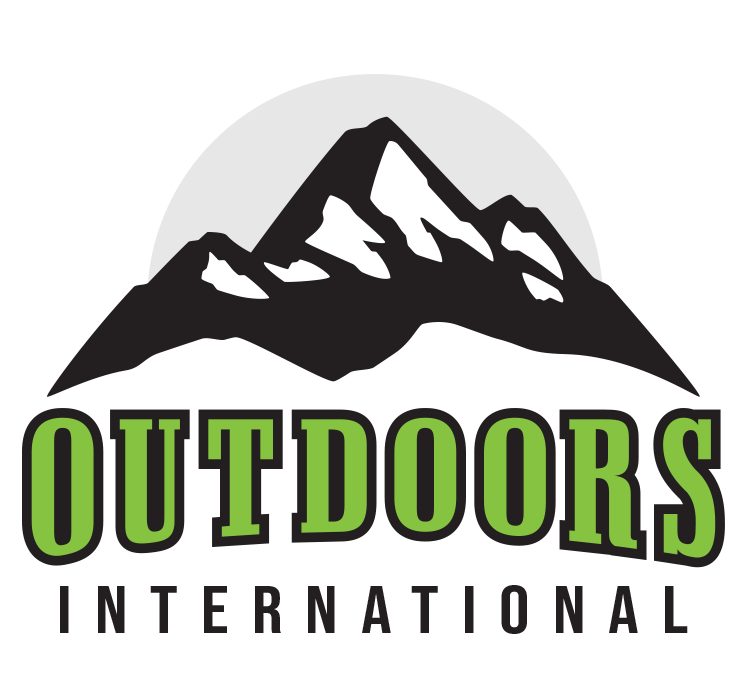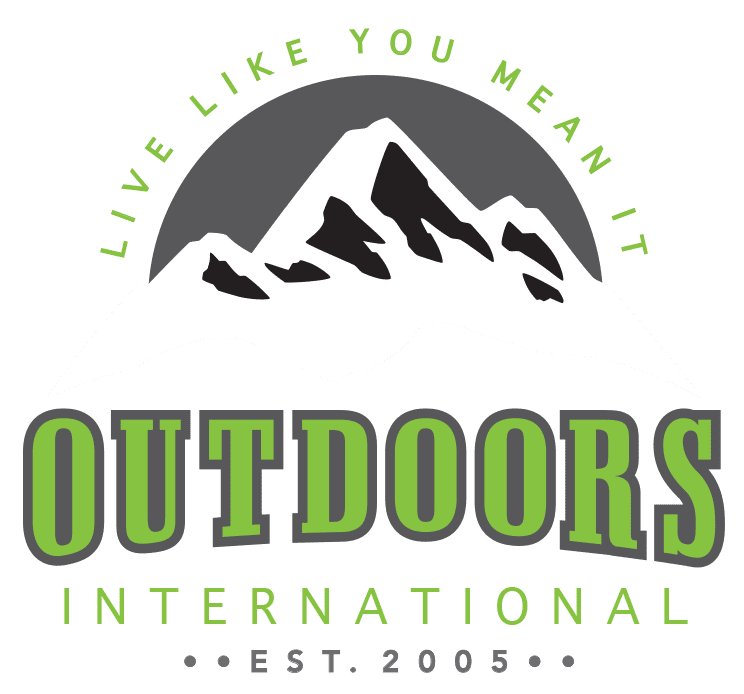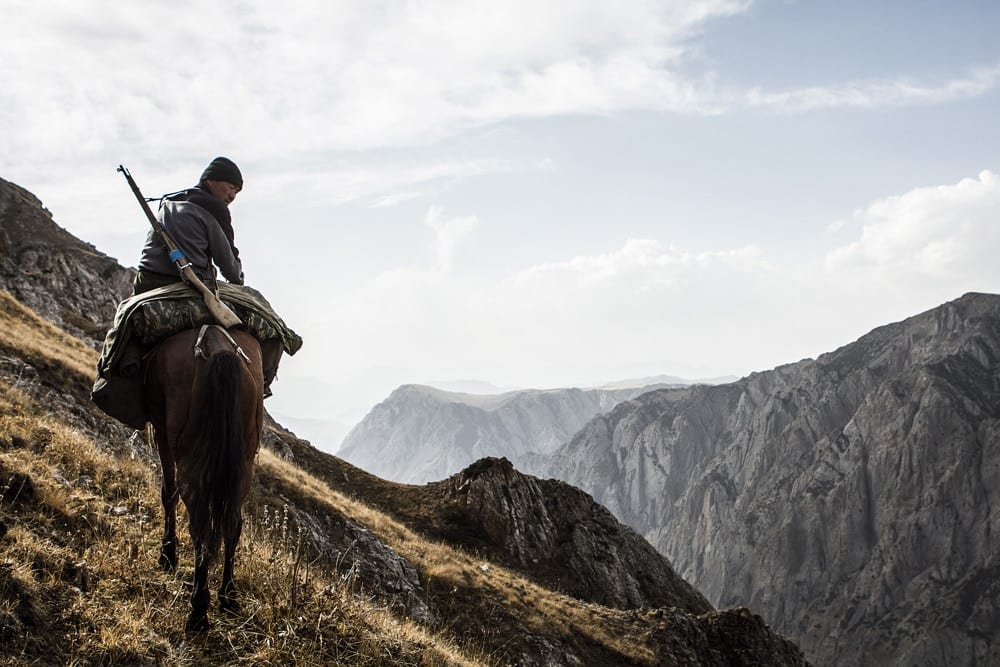Hunt #OI-AMO2
Marco Polo Sheep and Mid-Asian Ibex Hunting in Kyrgyzstan
Hunting in Kyrgyzstan is is a mountain hunt in every sense of the word. Hunts in Kyrgyzstan are very physically demanding and you should have some mountain hunting experience. Prime hunting areas are one of the most remote in Kyrgyzstan and are mainly located in the northeastern portion of the country. Hunting is conducted in Issyk-Kul and Naryn regions at 12, 000ft up to 13,500ft above the sea level between September – 1st December and 10 January – 28 February.
The areas are known for the legendary Lake Issyk-Kul.
One of world’s largest mountain lakes as well as the country’s largest river Naryn that originates in the northeast and flows westward through the middle of the country. While the terrain is high altitude, it is not extremely rugged, which enables us to reach base camps on Toyota Land Cruiser vehicles that are just the right means of transportation in a roadless territory. Rough, serpentine roads take you through a number of nerve-racking mountain passes and gorges, gradually ascending to 10,000 -12,000ft where the base camps are situated.
The region is often described as the ‘polar desert’. Not only does it pose challenge in terms of high altitude terrain, but also temperature wise that can get extremely cold and windy. Weather at such altitudes is rather unpredictable. Even the most experienced hunters may experience acute lack of oxygen, headaches, motion sickness and general weakness. To this reason we recommend to take one-day adaptation to the climate and altitude at the base camp. Since the climate is dry, keeping oneself well hydrated is a must. A good physical condition is a necessity, and also check with your doctor before the trip. Proper clothes and equipment are also key to combating harsh conditions.
Elevations vary, depending on location.
- Hunting is typically between 9,000‐14,000 ft. Most people don’t get altitude sickness, but a medication called Diamox can be taken to alleviate most symptoms. Arriving in good physical condition will also help.
- On the first day or two of your hunt, we try to take it easy so that you can rest up and adapt to sleeping and hiking at these higher elevations and conditions.
- Common side-effects of high altitude hunts include: shortness of breath, elevated pulse and blood pressure, headaches and a tired feeling.
- After a few days, most people adjust to the altitude and see noticeable performance improvements.

Trophy Ibex Hunts
Ibex hunting in Kyrgyzstan is very good as there is a healthy population of them. Ibex hunting here is generally very successful with great trophy quality.
The trophy area hunts are more remote and will be very physical, but the average Ibex taken in this area is 45” with a high chance of even larger trophies. For hunters wanting really big ibex (over 45”), then spiking-out in backpack style tents is necessary. The less remote area hunts still offer excellent hunting opportunities on average trophies, and fewer hours spent in a vehicle travelling to/from the area and Bishkek.
- Vehicles are used on many of the hunts, but because of the terrain, horses and walking will get hunters to the larger animals.
- If hunting with horses, you’ll find these people to be remarkable horsemen, and in some cases, they can get the hunter right to
the animal. - Spot & stalk hunting is the preferred method of hunting as it allows us to judge the animals with spotting scopes before making the final stalk. Shooting 300‐550 yards is often necessary. We don’t promote chasing/ driving animals.
- Hunters typically see many animals on Ibex hunts. Game densities are generally quite high and vary from area to area.
- Most of our Ibex hunts in Kyrgyzstan are limited to 2-3 hunters for maximum efficiency, while maintaining a personalized hunt.
- Can be a combo with Marco Polo sheep.
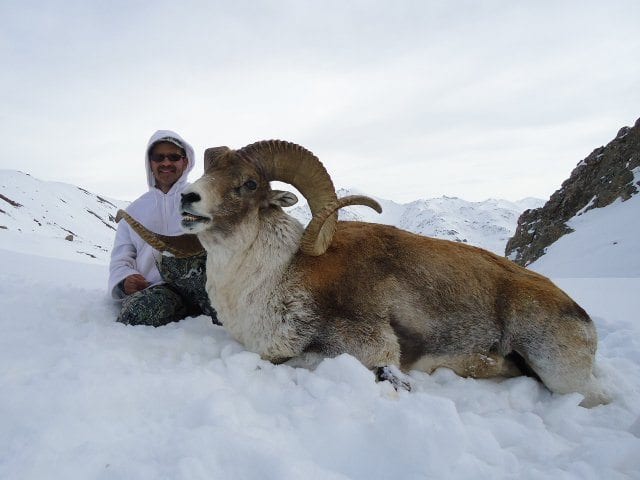
Marco Polo Sheep Hunts in Kyrgyzstan
Hunters typically see many animals on Marco Polo hunts, including Ibex. On a typical day, hunters could see several hundred Ibex and Marco Polo, but in some areas, hunters might only see 10 animals in 1 day. Game densities andram size can and will vary with location. We will put hunters in the areas to best meet their hunting goals and physical abilities.
Due to the difficulty and longer distances (250-550 yards) of the rifle shots required, many hunters miss game. We highly recommend taking a professional shooting course so that you have the skills necessary to use a rifle and scope with custom reticle and/or turret and so you don’t miss.
- Marco Polo hunting is very physically demanding and hunters need to be experienced mountain hunters.
- All hunters need to bring an Iridium Satellite phone and Western (AK/BC/MT) style hunting equipment.
- We have our own vehicles (Toyota Land Cruisers) and some Western style hunting equipment on most hunts.
- Our partners are reliable and experienced local outfitters who provide local guides, assistants, cooks, vehicles, horses, camps, food, lodging and interpreter (one per camp).
- They acquire the local licenses/tags/permits and CITES, where applicable, for the hunters, and they are politically well connected.

Accommodations vary depending on where you’re hunting.
- Some will have well-equipped base camp(s), complete with permanent buildings, Yurts, outhouses, a generator, furniture, stock corrals and trophy care facilities.
- Some camps are more of a spike camp, and will consist of Yurts, portable trailers and/or lightweight Hilleberg tents and portable gas stoves. Heat is by coal or dung burning stoves.
- Spike camps may have no stove.
- The food is basic: meats, rice, pasta, salami, bread, nuts, vegetables, fruit, and soups, but is quite good and filling.
- If you like special snack foods like candy bars, juice/energy drink mix and jerky, we recommend that you bring some with you and if you plan on spiking out (recommended), you’ll also need to bring some freeze dried meals and energy bars, as they are typically not available in this part of the world.
- Bottled water is generally available when staying in base camp, but if you are worried about drinking water, bring a water filter, Steri-Pen or purification tablets, especially for the spike out camps.
- Tea is served with every meal, so if you prefer coffee, you’ll need to let us know or just bring instant coffee. Sodas, fruit juice, beer and vodka are also provided.

Guides
We work with local outfitters who provide local guides, assistants, cooks, vehicles, horses, camps, food, lodging and interpreter (one per camp). They acquire the local licenses/tags/permits for the hunters, and they are politically well connected. There will generally be an English speaking, Kyrgyz manager in the hunting camp to make sure your needs and questions are being met; they can help guide if needed.
We can also arrange to have an American/Canadian guide (all have been involved with many successful hunts) accompany you in addition to the local staff. This is an additional cost. This optional service we are providing is unique for this type of hunt. Most other operations just set up the hunt with the local outfitters, but don’t actually have an English-speaking person to accompany you during the hunt. This service is quite helpful if you wish to harvest a very large animal, need help with trophy judging or the shooting process or if it is your first time in Asia, as most of the local guides do not speak English.

Travel is a bit of an adventure in itself.
Visas are not required in Kyrgyzstan any longer. The outfitter’s office manager and travel agent will help with all of your documentation preparation for your hunting trip. Including helping you arrange the commercial flight to Bishkek, Kyrgyzstan, typically through Istanbul, Turkey and Turkish Air.
- Your departing flight from the US will likely be JFK, Chicago O’Hare, Atlanta, San Fran, Houston or LAX in USA and Toronto or Vancouver from Canada.
- The next leg of the trip will be a stop is Istanbul, Turkey or sometimes Frankfurt, Germany. Total flight times vary from 16-20 hours, depending on your location.
- You’ll be met by an interpreter and management at the Bishkek Airport. We recommend paying the extra cost of a VIP transfer as there are less hassles and the service is much better/faster.
You’ll travel several hundred miles to the hunting area, using Russian 4×4 Jeeps.
- Depending on the camp location, most drives to base camps take 8-14 hours, depending on the camp location. If hunting late in the year (November), there is always a chance that a big snow can close roads for several days.
- Depending on when you arrive in Kyrgyzstan and how you feel, you’ll leave for camp mid-morning the day you arrive or early the next morning. We have had 1-2 day delays in town, waiting for permits or weather breaks.
- During the trip to base camp, there are several military/government and/or border checkpoints we travel through. Bribery money has not been necessary, but we can’t guarantee it will never happen.
- Helicopters are generally not available, but it could be an option if a group was interested and was willing to pay this additional cost.
A Kyrgyzstan hunt is typically on an 11-day schedule.
Day 1: Arrive early am. Stay in Bishkek 1 day, go ½ distance to hunting area (about 4-6 hrs) or some hunters drive the entire way
Day 2: Drive the rest of way to hunting area (5-10 hrs, depending on camp and weather). Or the entire way, depending on what is decided.
Day 3-9: Hunt or leave early if finished.
Day 10: Drive to Bishkek.
Day 11: Fly Home.
*Note: If hunt requires an extra 1-2 days, due to weather, delays or difficult hunting, hunt can be extended at no charge. There are daily flights to Bishkek from Istanbul (arriving early am), so rescheduling flights is generally not difficult if extra days are needed or if hunt finishes early.
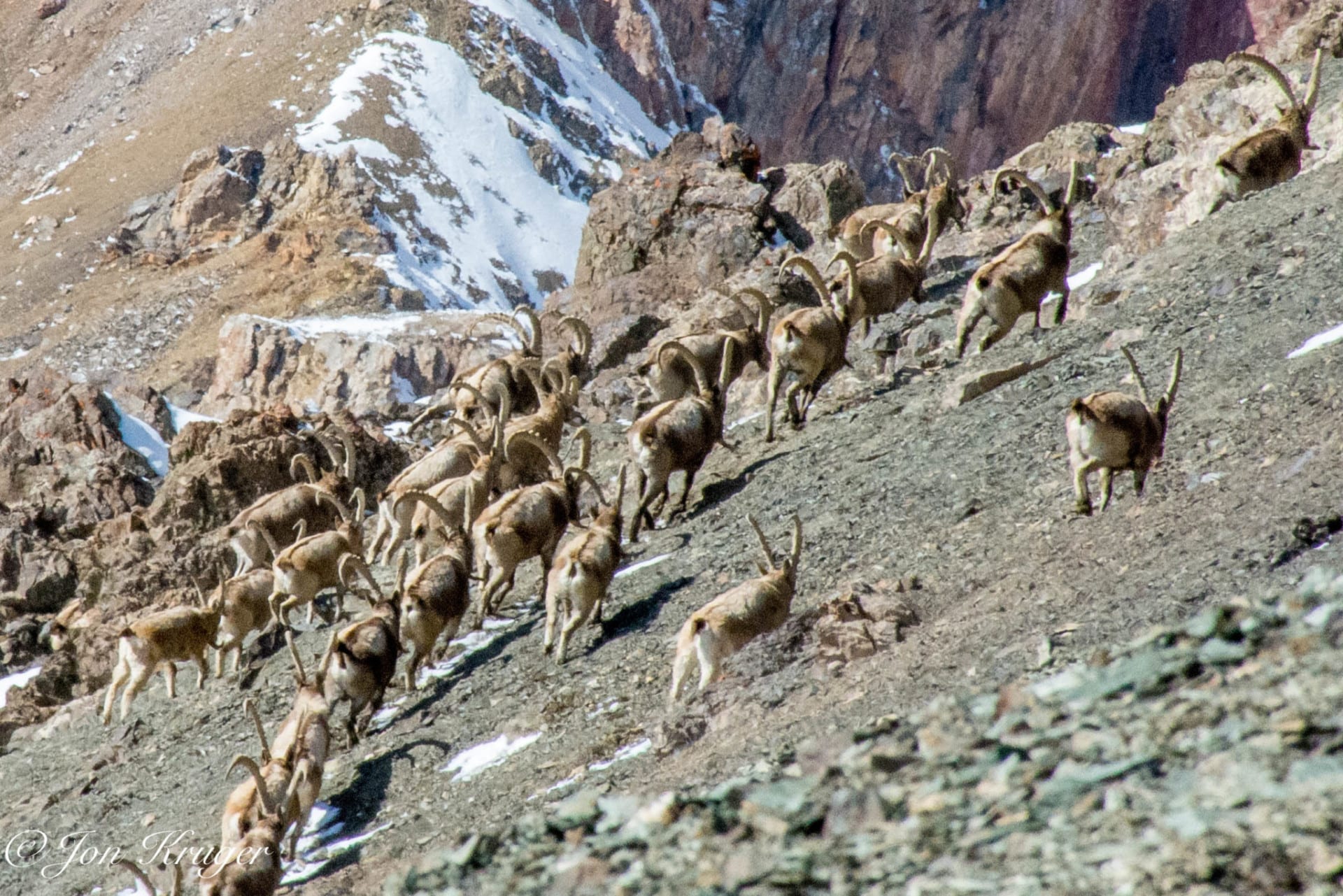
Booking Information
Interested in booking this trip? If you have not yet received pricing please request it here, and be sure to reference the trip number at the top of this page. Please note that reservations are not considered finalized until agreed upon deposit is received. This ensures agreed upon dates and current pricing. Quality outfitters are in high demand so let us know right away, as some trips do book years in advance.
Includes
- Travel and permit arrangements
- Firearm Permit
- All hunting licenses and tags
- Permits – Kyrgyz CITES & Vet Cert.
- Area Fees & Taxes
- Pickup and transportation from airport
- English Speaking Interpreter
- Local Guide and assistant per hunter
- Cabin or tent accommodations
- Lodging & meals while in Camp
- Trophy skinning and preparation
- Transportation – Jeeps and/or horses
Optional or Additional Hunt Costs
- Commercial Flight from US to Bishkek, Kyrgyzstan ($1,400‐2,100 USD) via Istanbul from US or Canada.
- 2‐3 nights lodging in Bishkek. Apartments are cheaper than hotels for longer stays but hotels are recommended.
- Extra baggage fee for hunting gear and trophy.
- Brokerage service at airport in US – scheduling with USFWS, clearing and shipping to final destination/taxidermist. If hunters clear their own trophy and ship or deliver to their tannery or taxidermist, then this fee is not applicable.
- Optional VIP Transfers through Bishkek Airport. (Highly recommended)
- Non‐hunter/observer
- Emergency, shopping or fun money for trip; Extended or special side trips: per request
- Trip Insurance
- Emergency Medical Insurance (recommended) – Global Rescue, Ripcord
- Tips and Gratuities – for Guides, drivers, interpreters, camp staff and management $800—1,200 for Ibex only hunts.
Booking Your Trip
When you’re ready to book, if you haven’t already ask your Outdoors International Consultant for updated pricing. If it looks good, your consultant will write up a booking agreement for you.
Why You Should Choose Outdoors International
Our goal is to be the most respected, knowledgeable and professional Consulting firm in the Outdoor Industry; to offer the best possible outdoor experiences to our clients with outstanding, vetted outfitters; to promote ethics and conservation; and have clients who want to return and use our service again and again.
